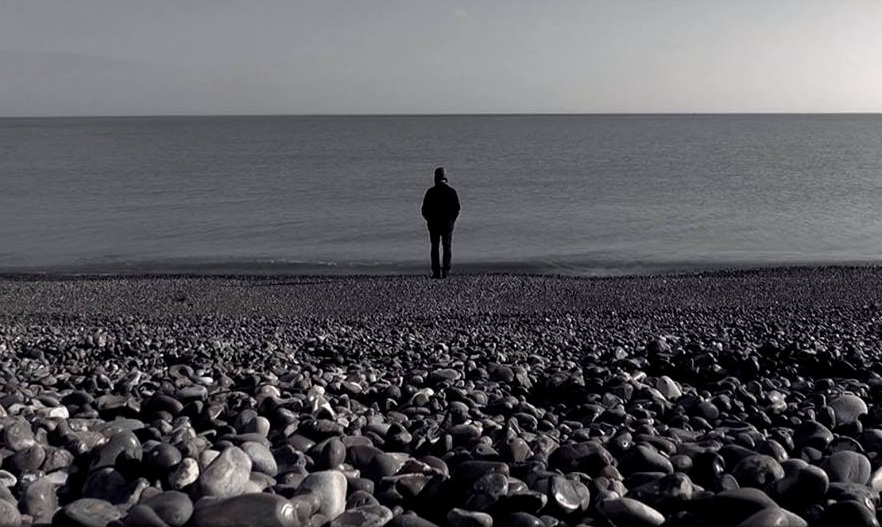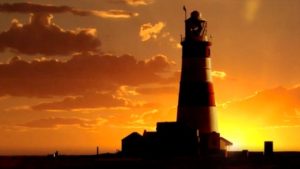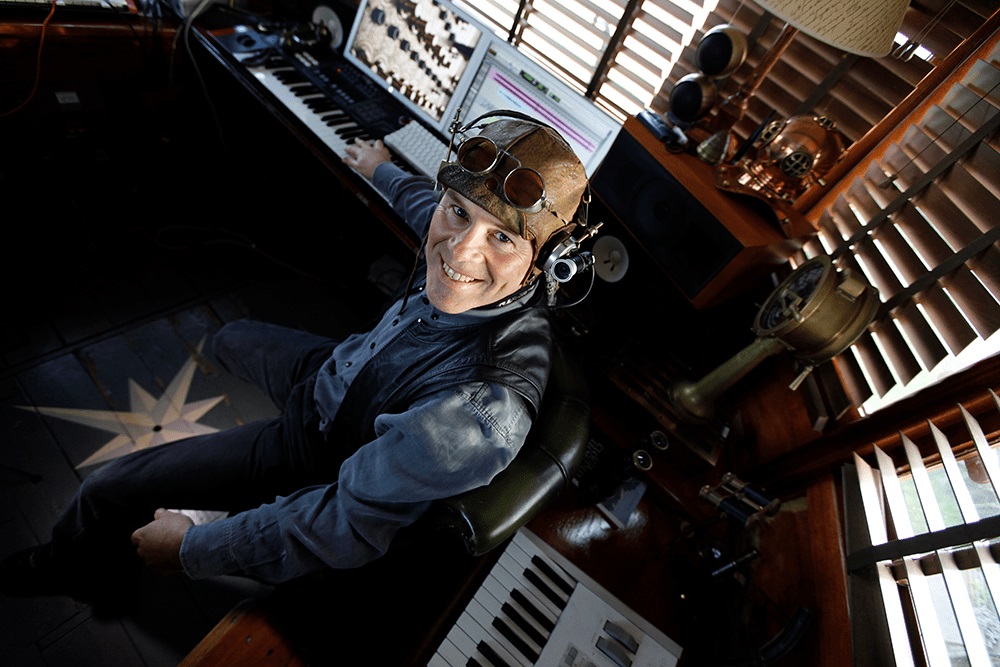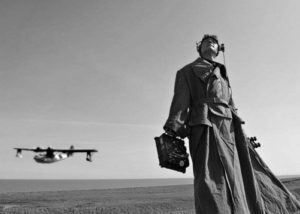“Since I was a small child, I have fallen asleep at night to the soothing periodic flash of the light on my bedroom wall”.
Former TED Talk music director and pop music maestro Thomas Dolby‘s ‘The Invisible Lighthouse’ tour is beaming its way around the UK, bringing Dolby’s love letter to a condemned lighthouse in Suffolk to a cinema perhaps near you.
It’s not only a filmic experience however – Dolby is providing a live soundtrack, selecting tracks from his back catalogue which harmonise with the theme of the sea and the countryside, pointing out for all but the most fanatical of fans the thematic narrative which exists through all of his work.
Dolby’s recent album ‘A Map Of The Floating City’ showed this strong affinity for the aquatic to be closer than ever to Dolby’s heart. In fact, his studio is now housed in a converted boat off the coast of East Anglia.
This film, a paen to childhood memory, the lighthouse of Orford Ness, and a bittersweet acknowledgement that the coast of his childhood is disappearing, takes the coastal theme and develops it into a visual meditation on time and the sea. ELECTRICITYCLUB.CO.UK spoke with TMDR about the past, technology, and the new golden age of synthesis.
The lighthouse has been used symbolically over many years to represent a dream-like place, the edge of the world. What symbolism does it hold for you as a creative inspiration?
A lighthouse is used by mariners to guide ships to safety, to reassure them by showing where they are on a stormy night. Knowing where you are on land serves a great purpose: there’s something comforting about being on land within the beam of a lighthouse.
Also many lighthouses have been there for hundreds of years so there’s a sense of security about that constancy. Also for me the mechanism of the lighthouse is so fascinating. It’s old technology in many ways, but has survived all this time. I think anyone who is into electronic music has a certain reverence for old technology.
Do you find any inspiration in the constant rhythm of a lighthouse? Do you think it might be something you brought with you into adulthood subconsciously?
There is, I think a lot of the sound of industry – mechanical and electrical pulses – in electronic music. THE HUMAN LEAGUE talk about how growing up in Sheffield was an influence, particularly on their early music. There is a definite correlation with rhythmic pulses in mechanics and music. I think anything repetitive in the environment that a mechanical pulse is going to feel like it influences recent generations of electronic music musicians.
The lighthouse keeper lives a remote life away from society – has that notion of the Lighthouse keeping recluse been attractive to you? Do you feel as a musician you might live a similar life?
The image of the lighthouse keeper – you can’t get more hermit-like than the lighthouse keeper.
Ironically, there are almost no lighthouse keepers around the British Isles any more – the lighthouses are now all automated. In a naive sense I hoped that when they turned off the light house on Orford Ness, some old man with a beard would come out and pull a lever and the connection would be closed. No chance! In Trinity House at the General Lighthouse Authority HQ it’s all very high tech: someone taps a few keys on a computer and it’s extinguished forever in something as simple as a few keystrokes. I am pretty introverted, but I think it’s enough that I work in a studio off the coast in a converted ship’s life boat in East Anglia. I don’t think my wife would agree with to living in a lighthouse.
This piece is a tribute to the lighthouse – to your memories of it when you were young. Does your fond association with older technology come out in this piece? Was the technology a consideration in creating the score? Did you tap the mad scientist within?
It’s really a romantic piece not a technical piece. My relationship with technology is really that it’s a means to an end. I’m not a gadget freak who is into technology itself – it’s what it opens up for me artistically. I think when you see the film you see a very personal and individualistic view of the light house and what it means to me and has meant to the neighbourhood I grew up in. I think it is a love letter to Suffolk and the area around Orford Ness with the lighthouse at its centre.
You used a lot of gadgetry to make the film though – allowing you to make the film yourself…
I have no problem balancing the technological aspects of the production – it doesn’t become all about that. Even though in filming I used a kit spy camera, a quadracopter, a go pro and did the digital editing myself on a laptop, it is all just about facilitating the power to tell the story of the lighthouse – it really is more of a lyrical poetic piece.
It sounds like technology is integral to what you do – and certainly at times you have written about older technology in your music. Would it be fair to say that your relationship with technology crosses into the emotional, even the nostalgic, from time to time?
It’s a layer I pass through to get to where I’m going creatively. When new technology comes along I love being one of the first people to dive in there and explore new possibilities. I’m certainly not afraid to make a tit of myself in trying. My father was an Archaeologist and was a specialist in Greek pots. The first times I travelled with him to a dig were in my teens and early 20s. I travelled around the Med with him, and at that point I realised that what really floated his boat was the history, poetry and storytelling behind the pots.
The history of the ancient Greeks was not written down, it was passed along by verbal means and they were deeply religious and superstitious. To get to that knowledge he had to pass through a layer of pots – it wasn’t about the pots themselves. As I came to realise, there are parallels in my writing – I deal with technology and electronics to get to the core of the piece, which is the emotional aspect of the stories I tell.
What are you interested in, in examining what is below the surface and through the creative process?
I’m interested in humans and the planet, and in reflecting what I see in the planet. To hold up a mirror to humanity is the main job of an artist. I could have done it as a novelist or painter or composer: but I do it by working across a range of different media. Often I’ll take on board new media as a new way to hold up that mirror.
For many users of electronic music technology, there’s a love affair with the synthesizer itself, and this has become particularly pronounced in the last few years with the increasing range and reasonable pricing of modular. Have you been caught up in modular fever?
Certainly less than I used to be. I think it’s great that it has become accessible to a wide range of people, and now you don’t have to be a rich rock star or work for the electronic music department of a University to get your hands on it. Now if you want to use a synth you can download an iPhone or Android app to simulate vintage synths for you. You get to do all that exploration without the downside of how heavy and awkward it is, and without the outlay. No more huge boxes to cart in and out of transit vans… so it’s great that it’s opened up to a wider range of people. But do I get the same joy out of it now? No, quite frankly. I’ve been there and done that. I’ll use it as a tool where necessary today but I’m more interested in moving on to the next area of technology.
And what is that for you?
The same thing that happened with sythesizers is now happening with film. Before now, if you wanted to make a film you’d need a crew and lots of expensive gear, but now you can do it all yourself for a few hundred pounds worth of consumer kit. Now that there is this affordable kit stories like my lighthouse story will get told by individuals, by people like myself. These stories never would have gotten told if they had to go through the studio system and tv hierarchy, and there are so many fascinating stories to be told.
Have you been planning another film piece now that ‘The Invisible Lighthouse’ has been made?
I haven’t thought beyond this project so far, but I love the ability to use film as one more tool in my future projects. I see this film, music and tour all as a part of the ‘Floating City’ part of my career. There’s a whole world that has been created online and through the computer game, and this film sets out the geography of that world and the environment responsible for the music you hear on the album. Finishing this film and tour will complete the ‘Floating City’ cycle and then I can move on.
Aren’t you able to work on anything new until this is finished?
No – I’m a lot more linear in how I work. I tend to have a single focus at any point in time.
You’ve selected a range of songs from the early days of your career to now: how do they fit with the theme of ‘The Invisible Lighthouse’?
There are a couple of really old songs from 1980-ish and several from recent albums – my whole back catalogue contains themes which are a continuum that runs through my songs. I think hardcore fans recognise some of those repeating characters and themes in my music. But it would be fair to say that what all the songs in this film have in common is that they’re all very influenced and touched by the countryside and atmosphere of the coast in Suffolk where I lived.
How do you feel about your early songs? Do you find them more difficult to be enthusiastic about now? Do you ever feel reluctant to play ‘She Blinded Me With Science’ or ‘Hyperactive’ for example?
I’ve always felt very comfortable with songs from my past, and I’m very proud of everything I’ve done. Sure, there are some nights when I choose to play slightly different songs, sometimes less obvious crowd pleasers, songs which weren’t commercial hits. My hardcore fans don’t talk about ‘Hyperactive’, they talk about ‘Airwaves’ or ‘Screen Kiss’ Some audiences clearly want to hear the hits, and I’m not ashamed to play them
Do you feel there’s a strong enough thread running through the music for people who aren’t your fans to pick it up?
The other day I played at The Eden Project and an elderly couple who looked quite out of place were there. It turned out they had read about the show in a Cornish newspaper, so they had come to see me because they also felt a bond with that coast line.
Did they appreciate your music?
When we played ‘Hyperactive’ they got up and left. *laughs*
But, honestly, this project has introduced many new people to my music, and it’s a delight to play to people who have no expectations or knowledge. My hardcore audience tend to be delighted with whatever I choose to play, and that doesn’t feel the same as winning over new fans from scratch.
For the US shows you’ve chosen to work with a visual ‘Foley’ artist Blake Leyh to manipulate your soundtrack with effects. You also worked with him on the London show. What made you decide to bring him into the project?
I’ve known and collaborated with Blake for a number of years. He’s a very celebrated sound designer from New York. We were talking about the show and he said has always liked the idea of doing sound design live like the ‘Foley’ artists of the old days would do in Hollywood movies. He wasn’t able to do the UK tour unfortunately but will do the US tour. It will be interesting to see how he fleshes out my sound. It will be like playing with other musician live.
Do you find collaboration easy or difficult? Are you a control freak about your own music or relaxed in working with other people?
I’m quite controlling in that I’m quite able to arrange all of my sounds myself without outside help, and I have strong opinions about how it should go together. But in working with other musicians that’s pointless and not satisfying for any of us so I have to relinquish control somewhat and let people be themselves – or else why hire them?
ELECTRICITYCLUB.CO.UK gives its sincerest thanks to Thomas Dolby
With thanks to Tracy Gosling PR
‘The Invisible Lighthouse’ Tour featuring a screening with live narration and musical soundtrack linking songs from various stages of his career continues at: Liverpool FACT Cinema (22nd Sept), Cambridge Picturehouse (25th September), Edinburgh Cameo Picturehouse (29th September), Nottingham Broadway Cinema (2nd October), Derby QUAD Cinema (3rd October), Sheffield Showroom Cinema (4th October)
The tour also extends to The United States, please visit www.thomasdolby.com for more details
https://www.facebook.com/officialthomasdolby
https://twitter.com/ThomasDolby
Text and Interview by Nix Lowrey
21st September 2013





Follow Us!